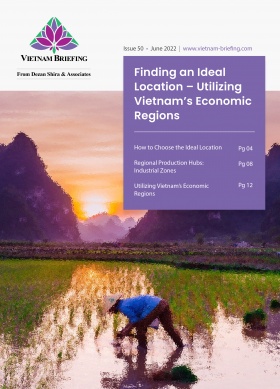US Presidential Envoy Visit to Vietnam Underlies Cooperation on Climate Change Issues
US Special Presidential Envoy for Climate John Kerry made a visit to Vietnam and met with Prime Minister Pham Minh Chinh to hold talks about Vietnam-US cooperation in combating climate change and scaling up the transition to a clean energy economy in Vietnam. Vietnam Briefing summarizes key highlights of the visit and explores the opportunities for US businesses in Vietnam.
US Special Presidential Envoy for Climate, John Kerry visited Ho Chi Minh City and Hanoi from September 2nd to 6th to hold bilateral climate discussions with Vietnamese government officials, civil society representatives, and prominent entrepreneurs to address climate change.
Vietnam’s Prime Minister Pham Minh Chinh warmly welcomed Kerry, emphasizing appreciation for the US’ support in Vietnam’s green economy transition and the COP26 goal of achieving net zero emission by 2050.
Key outcomes
Kerry identified many challenges that Vietnam is facing during the transition to a green energy economy.
First, Kerry stressed a lack of synchronization among localities in the transmission system between renewable energy plants and the national grid. As a result, renewable energy in Vietnam is being utilized far below capacity, at only four percent when it can satisfy up to 25 percent of the national demand.
Second, regarding the draft Power Development Plan 8 (PDP 8), Kerry emphasized the importance of minimizing the role of coal in electricity generation. In fact, as stated in the draft PDP 8 goals, Vietnam eyes 19-20 GW of solar and 18-19 GW of wind but still aims to source up to 37 GW from coal and 22 GW from gas. As such, Kerry advised the Vietnamese government to leave out coal in the country’s long-term strategy if Vietnam wants to achieve net zero emission status.
Third, according to Kerry, the US can be Vietnam’s trusted partner in the green energy sector through financial aid, technology transfer, and expertise in management models. US businesses in the renewable energy sector consider Vietnam to be a budding destination and are ready to invest in the country. However, one factor that is still preoccupying many US investors is the lack of guarantees.
Kerry stated that US investors are willing to make major investments only when they foresee high returns in the market. Although Vietnam holds immense potential for green energy exploitation, the market is rather young which may cause investors to be undecided.
To address this issue, Kerry hopes to see more attractive incentive policies from the Vietnamese government to promote a welcoming and world-class playground for foreign renewable energy businesses.
One point to note is that Kerry highly appraised the efforts of Vinfast to introduce electric vehicles (EV) in the US market as the country moves towards sustainable transportation. Jake Levine, Chief Climate Officer at the US International Development Finance Corporation (DFC), stressed that DFC is willing to support Vinfast to build a domestic EV manufacturing chain in Vietnam.
PM Chinh, also proposed different approaches to combat the climate crisis. Regarding technology, the PM hoped partners in the US would carry out renewable-energy technology transfers to Vietnamese firms to assist in manufacturing renewable energy equipment. Vietnam eyes the technological expertise of US firms, which can help Vietnam to establish an assessment map of onshore and offshore sources of solar and wind power.
The PM also proposed lower loan credit for Vietnamese firms from US partners to cushion the financial burdens. In fact, many businesses in Vietnam still hesitate to penetrate into the green energy market due to limited access to capital sources and high credit rates. Vietnam also called for financial aid in building a synchronous electricity transmission system so that average people can afford renewable energy.
Foundation for Vietnam-US climate cooperation
It is worth noting that Vietnam is still discussing the possibility of becoming a member country of the Indo-Pacific Economic Framework (IPEF) launched by the US to promote sustainable development. Kerry’s visit to Vietnam may have positive implications for discussions regarding the participation of Vietnam in the IPEF.
The US has shown support for the renewable energy sector in Vietnam in previous projects. During US-Vietnam Energy Security Dialogue in July 2022, the US Trade and Development Agency (USTDA) offered a grant to Vietnam’s state-owned National Power Transmission Corporation of Vietnam (EVNNPT) – which entailed technical support to scale up the utilization of smart grid technology.
In addition, in June 2022, US President Joe Biden also brought the tariff imposed on Vietnam’s solar panels to zero for 24 months. This move further stressed tighter cooperation between the two countries in pursuing a green economy transition.
Takeaways
Kerry’s visit to Vietnam amid the global energy crisis and alarming climate change indicates strong commitment of the US to being a trusted partner of Vietnam in a bilateral climate context. Kerry further reiterated even further opportunities for US businesses if Vietnam focuses on clean power and renewable energy
About Us
Vietnam Briefing is produced by Dezan Shira & Associates. The firm assists foreign investors throughout Asia from offices across the world, including in Hanoi, Ho Chi Minh City, and Da Nang. Readers may write to vietnam@dezshira.com for more support on doing business in Vietnam.
We also maintain offices or have alliance partners assisting foreign investors in Indonesia, India, Singapore, The Philippines, Malaysia, Thailand, Italy, Germany, and the United States, in addition to practices in Bangladesh and Russia.
- Previous Article How are Foreign Investors Responding to Vietnam’s New Data Localization Regulation
- Next Article Vietnam Business Integrity Index: Enhancing Accountability and Enterprise Conduct







